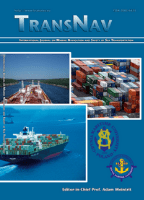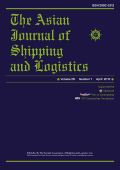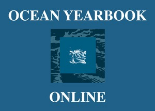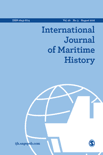
Transactions on Maritime Science-ToMS
Scope & Guideline
Pioneering Insights for a Sustainable Maritime Future
Introduction
Aims and Scopes
- Maritime Transportation and Logistics:
Research on improving efficiency in maritime transport, including studies on port operations, vessel performance, and logistics management. - Environmental Impact and Sustainability:
Explorations of the environmental consequences of maritime activities, focusing on pollution, resource management, and sustainable practices in shipping. - Technological Innovation in Maritime Science:
Studies on the implementation of new technologies such as autonomous vessels, digitalization, and cybersecurity within the maritime industry. - Legal and Regulatory Frameworks:
Analysis of maritime law, regulations, and policies affecting shipping practices, including compliance, safety, and international agreements. - Human Factors in Maritime Operations:
Investigations into the well-being and professional development of seafarers, including communication skills, occupational stress, and training methodologies.
Trending and Emerging
- Digitalization and Smart Technologies:
There is a growing emphasis on the role of digital technologies in the maritime sector, including the use of big data, machine learning, and automation to enhance operational efficiency and safety. - Environmental Sustainability and Climate Change:
Research focusing on the environmental impact of maritime activities, particularly in relation to climate change and sustainable practices, has gained prominence. - Cybersecurity in Maritime Operations:
As maritime activities become increasingly digitized, the focus on cybersecurity threats and risk management strategies for vessels and ports is emerging as a critical area of research. - Seafarers' Wellbeing and Human Factors:
The importance of mental health and occupational safety for seafarers is being recognized, leading to more studies aimed at improving their working conditions and overall well-being. - Regulatory Frameworks and Compliance:
An increasing number of papers are addressing the complexities of international maritime law and compliance, particularly in light of evolving global standards and practices.
Declining or Waning
- Traditional Shipbuilding Techniques:
Research related to conventional shipbuilding methods has decreased, likely due to the industry's shift towards innovative materials and technologies. - Historical Maritime Studies:
There has been a noticeable reduction in papers focusing on historical analyses of maritime practices, suggesting a move towards contemporary issues and future-oriented research. - General Maritime Safety Protocols:
While safety remains a priority, the focus on broad safety protocols appears to be waning in favor of more specialized studies, such as those on specific risks or technological solutions.
Similar Journals

TransNav-International Journal on Marine Navigation and Safety of Sea Transportation
Transforming Maritime Practices with Innovation.TransNav - International Journal on Marine Navigation and Safety of Sea Transportation is a leading scholarly publication that addresses the critical themes of marine navigation and maritime safety. Published by Gdynia Maritime University in Poland, this open-access journal has been a vital resource since its inception in 2007, fostering a global dialogue among researchers, maritime professionals, and students. With an impressive trajectory of convergence from 2019 to 2024, TransNav is recognized for its impact in the realm of Ocean Engineering, Oceanography, and Transportation, holding a notable Q3 ranking in Ocean Engineering and Q4 rankings in both Oceanography and Transportation for 2023. The journal serves as an essential platform for disseminating research findings and advancements that enhance safety protocols and navigation strategies in sea transportation, thus contributing to the sustainability and efficiency of maritime operations worldwide. Researchers can access its wealth of information through various academic databases, ensuring that your work remains on the cutting edge of this vital field.

Asian Journal of Shipping and Logistics
Connecting Knowledge with Real-World Logistics ChallengesAsian Journal of Shipping and Logistics, published by Elsevier, is a premier Open Access journal dedicated to advancing research in the fields of shipping, logistics, and transportation. Established in 2009, the journal is indexed in Scopus and boasts an impressive 2023 category quartile ranking of Q2 across various related disciplines including Business and International Management, Management of Technology and Innovation, and Transportation. With its mission to explore innovative solutions and contemporary challenges within these dynamic sectors, the Asian Journal of Shipping and Logistics serves as an essential platform for researchers, academics, and practitioners aiming to stay at the forefront of knowledge in logistics operations and economic strategies. The journal's strong emphasis on real-world applications and cutting-edge methodologies makes it indispensable for those interested in enhancing the efficiency and effectiveness of shipping and logistics systems in a global context. For more information, please visit our website and explore our open-access articles, which provide a wealth of research findings accessible to the broader community.

International Journal of Marine and Coastal Law
Fostering Dialogue on Contemporary Marine Legal ChallengesThe International Journal of Marine and Coastal Law, published by Martinus Nijhoff Publishers, is a leading academic periodical dedicated to the exploration of legal aspects related to marine and coastal environments. With a strong emphasis on interdisciplinary research, this journal serves as a vital resource for scholars, practitioners, and policymakers engaged in areas such as environmental science, oceanography, and law. Since its inception in 1986, the journal has continuously evolved to address contemporary challenges in the field, boasting a commendable Q2 ranking in Law and Q3 rankings across various relevant categories. The journal facilitates rigorous discourse on pressing issues, providing a platform for high-quality research that aims to inform legal frameworks and enhance sustainable practices. Although it does not offer open access, the journal’s impact extends to its notable Scopus rankings and its essential role in shaping legal discourse on marine and coastal management. Researchers and professionals will find invaluable insights and scholarly contributions that are crucial for advancing knowledge and policy in this critical area of study.

International Journal of Maritime Engineering
Bridging Theory and Practice in Maritime EngineeringThe International Journal of Maritime Engineering (ISSN: 1479-8751, E-ISSN: 1740-0716), published by UNIV BUCKINGHAM PRESS in the United Kingdom, is a vital resource for the maritime engineering community, addressing pressing issues in both Environmental Engineering and Ocean Engineering. Established in 2006, this journal serves as a platform for disseminating innovative research, technological advancements, and practical solutions that enhance the sustainability and efficiency of maritime operations. With its current classification in the Q3 quartile for both fields in 2023, it offers valuable insights to researchers, professionals, and students who seek to bridge theoretical knowledge with industry applications. Though the journal does not operate under an open access model, it remains an essential reference for academic discourse and advancement in maritime studies through its rigorous peer-review process and high-level research outputs.

Asia-Pacific Journal of Ocean Law and Policy
Exploring Legal Frontiers in Ocean GovernanceAsia-Pacific Journal of Ocean Law and Policy is an essential publication in the realm of maritime law and policy, dedicated to fostering a deeper understanding of legal issues pertaining to ocean governance in the Asia-Pacific region. Published by BRILL, a reputable publisher known for its scholarly contributions, this journal serves as a vital platform for researchers, professionals, and students engaged in the interdisciplinary fields of law, environmental science, and international relations. With its unique focus on current challenges and developments in ocean policy, it aims to bridge knowledge gaps and promote informed discourse among stakeholders. Although the journal operates on a subscription basis, it is committed to disseminating high-quality research that addresses pressing maritime issues, thus influencing policy-making and legal frameworks in this crucial area. As the Asia-Pacific region continues to play a pivotal role in global marine affairs, the Asia-Pacific Journal of Ocean Law and Policy stands out as a critical resource for those looking to navigate the complex interplay of law and oceanic policy.

International Maritime Health
Innovating Solutions for Maritime Health IssuesInternational Maritime Health is a distinguished, open-access journal published by VIA MEDICA that has been pivotal in disseminating research related to maritime health since its inception in 1999. With an ISSN of 1641-9251 and an E-ISSN of 2081-3252, the journal focuses on various aspects of Infectious Diseases, Medicine, and Public Health, making significant contributions to environmental and occupational health, particularly in maritime contexts. As of 2023, it enjoys a Q3 ranking in prominent categories, highlighting its relevance and impact in the field, supported by Scopus ranking that places it competitively within its domains. Open access since 2005, International Maritime Health provides researchers, professionals, and students vital resources to understand and tackle health challenges faced in maritime environments, facilitating the exchange of knowledge that is crucial for enhancing health outcomes in this unique sector. The journal is based in Gdansk, Poland, emphasizing its global outreach and commitment to addressing maritime health issues.

NAVAL RESEARCH LOGISTICS
Exploring the Depths of Naval Logistics ExcellenceNAVAL RESEARCH LOGISTICS is a prestigious scholarly journal, published by WILEY, that serves as a vital platform for researchers and professionals in the fields of management science, operations research, ocean engineering, mathematics, and modeling and simulation. With an impressive impact factor and recognized as a Q1 journal in its respective categories, it reflects the highest standards of quality and rigor in research dissemination. Covering discussions from its inception in 1973 to the present, NAVAL RESEARCH LOGISTICS addresses key issues and innovations in logistics and operational challenges, particularly within the naval context, thus making significant contributions to policy and strategic decision-making. The journal is not currently available as an open-access publication, yet it provides rich insights essential for academics, industry experts, and students keen on advancing their knowledge in logistics and operations related to maritime applications. With a commitment to bridging theory and practice, this journal is an indispensable resource for anyone connected to the maritime logistics field.

Ocean Yearbook
Illuminating the Intersection of Law and Oceanic StewardshipOcean Yearbook, published by BRILL, is a leading academic journal in the field of maritime law and ocean governance, providing a comprehensive platform for researchers and practitioners in this vital area. With an ISSN of 0191-8575 and E-ISSN 2211-6001, this journal offers valuable insights and critical analyses on contemporary issues affecting the world's oceans, promoting interdisciplinary dialogue among scholars in law, environmental studies, and policy-making. Currently ranked in the Q2 quartile for Law, this journal is positioned among the top-tier publications, reflecting its commitment to academic excellence and relevance. Ocean Yearbook is essential reading for those looking to stay abreast of legal developments and emerging challenges in ocean governance, contributing significantly to policy discussions and academic scholarship worldwide. Its accessibility through subscription, combined with its ongoing commitment to high-quality research, makes it an indispensable resource for students, researchers, and professionals dedicated to understanding and protecting marine ecosystems.

Journal of East Asia and International Law
Connecting East Asian Legal Insights with Global DiscourseThe Journal of East Asia and International Law, published by the YIJUN Institute of International Law, serves as a vital platform for scholarly discourse in the field of law, with a particular focus on the complexities of East Asian legal systems and their interactions within the global context. Established in 2011 and based in Seoul, South Korea, this journal has been pivotal in fostering research that examines legal issues impacting East Asia, making significant contributions to the understanding of international law in this dynamic region. With its ISSN 1976-9229, the journal provides a valuable resource for researchers, professionals, and students interested in the evolving legal landscapes of East Asia. Though currently categorized in the Q4 quartile for law in the Scopus rankings, its dedication to enhancing legal scholarship positions it as a relevant player among emerging international law journals, encouraging submissions that explore innovative legal approaches and analyses. As ongoing interdisciplinary discussions deepen, the Journal of East Asia and International Law aims to enrich the academic community's understanding of international legal frameworks within East Asian contexts.

International Journal of Maritime History
Charting New Courses in Maritime ResearchThe International Journal of Maritime History is a distinguished academic publication dedicated to the exploration of maritime history, providing a platform for innovative research and scholarship in the field. Published by SAGE Publications Ltd, this journal aims to enhance our understanding of maritime activities and their impact on global historical narratives. With an ISSN of 0843-8714 and E-ISSN 2052-7756, the journal has established itself as a vital resource for historians, social scientists, and transportation scholars alike. Notably, it has achieved a respectable Q2 ranking in History and a Q4 ranking in Transportation, alongside being placed in the 57th percentile for History and 4th percentile for Transportation according to Scopus rankings. The journal spans converged years from 2001 to 2002 and 2011 to 2024, encouraging scholarly discourse on the intricate relationships between maritime practices, cultural exchange, and global developments. Accessibility options may vary, and contributors are invited to engage with historians and researchers in advancing maritime discourse. Commencing your journey into the depths of maritime studies begins here.